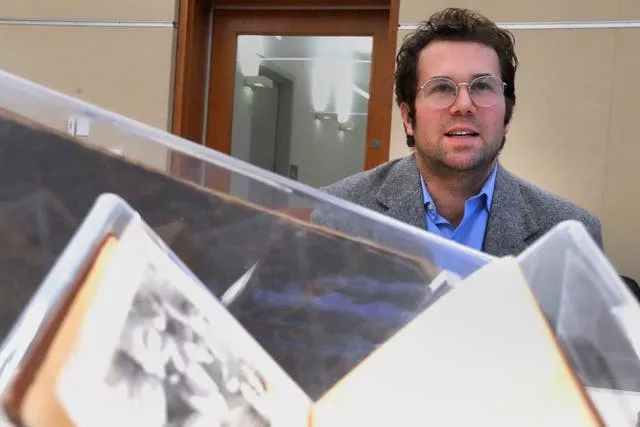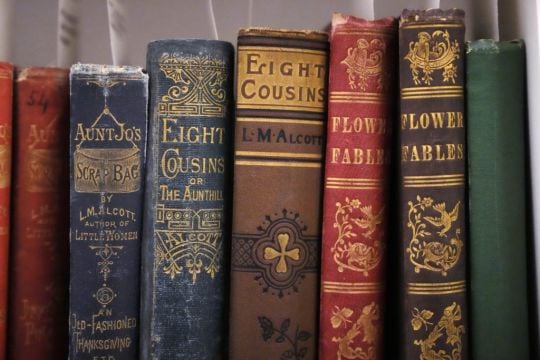The author of Little Women may have been even more productive and sensational than previously thought.
Max Chapnick, a postdoctoral teaching associate at Northeastern University, believes he has found about 20 stories and poems written by Louisa May Alcott under her own name as well as pseudonyms for local newspapers in Massachusetts in the late 1850s and early 1860s.
One of the pseudonyms is believed to be EH Gould, including a story about her house in Concord, Massachusetts, and a ghost story along the lines of the Charles Dickens classic A Christmas Carol.
He also found four poems written by Flora Fairfield, a known pseudonym of Alcott’s. One of the stories written under her own name was about a young painter.

“It’s saying she’s really like … she’s hustling, right? She’s publishing a lot,” Mr Chapnick said on a visit to the American Antiquarian Society in Worcester, a national research library of pre-20th century American history and culture that has some of the stories he discovered in its collection as well as a first edition of Little Women.
Alcott remains best known for Little Women, published in two instalments in 1868-69.
Her classic coming-of-age novel about the four March sisters: Meg, Jo, Beth and Amy; has been adapted several times into feature films, most recently by Greta Gerwig in 2019.
Mr Chapnick discovered Alcott’s other stories as part of his research into spiritualism and mesmerism.

As he scrolled through digitised newspapers from the American Antiquarian Society, he found a story titled The Phantom.
After seeing the name Gould at the end of the story, he initially dismissed it as Alcott’s story. But then he read the story again.
Mr Chapnick found the name Alcott in the story – a possible clue – and saw that it was written about the time she would have been publishing similar stories.
The story was also in the Olive Branch, a newspaper that had previously published her work.
As Mr Chapnick searched through newspapers at the society and the Boston Public Library, he found more written by Gould – though he admits definitive proof they were written by Alcott has proven elusive.
“There’s a lot of circumstantial evidence to indicate that this is probably her,” said Mr Chapnick, who last year published a paper on his discoveries in J19, the Journal of Nineteenth-Century Americanists.
“I don’t think that there’s definitive evidence either way yet. I’m interested in gathering more of it.”
When first contacted by Mr Chapnick about the writings, Gregory Eiselein, president of the Louisa May Alcott Society, said he was curious but sceptical.
“Over my more than 30-year career as a literary scholar, I’ve received a variety of inquiries, emails, and manuscripts that propose the discovery of a new story by Louisa Alcott,” Mr Eiselein, also a professor at Kansas State University, said in an email interview.
“Typically, they turn out to be a known, though not famous, text, or a story re-printed under a new title for a different newspaper or magazine.”
But he has come to believe that Mr Chapnick has found new stories, many of which shed light on Alcott’s early career.
“What stands out to me is the impressive range and variety of styles in Alcott’s early published works,” he said.
“She writes sentimental poetry, thrilling supernatural stories, reform-minded non-fiction, work for children, work for adults, and more.
It’s also fascinating to see how Alcott uses, experiments with, and transforms the literary formulas popular in the 1850s.”
Another Alcott scholar at Kansas State, Anne Phillips, said she was “excited” by Chapnick’s scholarship and said his paper makes a “compelling case” that these were her writings.
“Alcott scholars have had decades to compare her work in different genres, and that background is going to help us evaluate these new findings,” she said in an email interview.
“She reworked and reused names and situations and details and expressions, and we have a good, broad base from which to begin considering these new discoveries,” she said.
“There’s also something distinctive about her writing voice, across genres.”
This is not the first time that scholars have found stories written by Alcott under a pseudonym.
In the 1940s, Leona Rostenberg and Madeleine Stern found thrillers written under the name AM Barnard was an Alcott pseudonym.
She also wrote nonfiction stories, including about the Civil War where she served as a nurse, under the pseudonym Tribulation Periwinkle.







